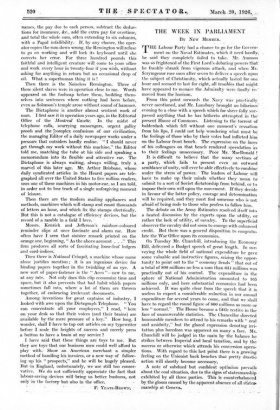THE WEEK IN.. PARLIAMENT
BY NEW MEMBER.
THE Labour Party had a chance to go for the Govern- ment on the Naval Estimates, which it need hardly be said they completely failed to take. Mr. Ammon was so frightened of the First Lord's debating powers -that he frankly shrank. from vigorous attack, and when Mr. Serym. ,geour rose soon after seven to deliver a speech upon the subject of Christianity, which actually lasted for one hour and seemed to last for eight, all troubles that might• have appeared to menace the Admiralty were finally fe- moVed from the "horizon.
From this poirit onwards the Navy BFas practically - never mentioned, and Mr. Lansbury brought an hilarious- evening to a close with a 'speech which for sheer folly stir-- passed anything that he has -hitherto attempted in the present House of Commons. Listening to the torrent of balderdash which fell without one moment's 'cessation from his lips, I could- not help wondering what must he the feelings of those 'who by their votes had inflicted him on the Labour front bench. The expression on the faCea of his colleagues on that bench rendered -speculation as to their feelings Unnecessary. PoOr Mr. MaeDoriald r It is difficult to believe that the many sections of a party, which fails to present even- an outward semblance of unity, will ever be able effectively to einiiiiine under the stress • of power. The leaders of Labour Will hini-e to make up ' their 'Minds whether they mean to submit to a sort of Soviet dictatorship from behind, or to impose their Own will- Upon the movement. If they decide in favour of the latter policy, courage and determination will be required, and they must find someone who is not afraid of being rude to those who profess to follow him.
The debate on the Army Estimates resolved itself into a heated discussion by the experts upon the utility, or rather the lack of utility, of cavalry. To the superficial observer the cavalry did not seem to emerge with enhanced credit. But there was a general disposition to congratu7 late the War Office upon its economies.
On Tuesday Mr. Churchill, introducing the Economy Bill, delivered a Budget speech of great length. In sur.! veying the whole field of national expenditure he gave some valuable and instructive figures, seizing the oppor7 tunity to point out to the " economy fiends " that out of a total of 800 millions no less a sum than 634 millions was practically out of his control. The expenditure in the sphere of National Administration amounted to 165 millions only, and here substantial economies had been achieved. It was quite clear from the speech that it is useless to expect a considerable reduction in our:annual expenditure for several years to come, and that we shall have to regard the round figure of 800 millions as more or less " normal." The House became a little restive in the face of unanswerable statistics. The Chancellor directed honourable members to attend to his remarks with " zeal and assiduity," but the glazed expression denoting irri- tation plus boredom was apparent on many a face. Mr. Churchill will be judged in the main by the balance he strikes between Imperial and local taxation, and by the success or otherwise which attends his conversion opera- tions. With regard to this last pOint there is a growing feeling on the Unionist back benches that pretty drastic action will shortly become necessary, A note of subdued but confident optimism prevails about the coal situation, due to the signs of statesmanship exhibited by all three parties. This is counterbalanced by the gloom caused by the apparent absence of all states- manship at Geneva. • -


























































 Previous page
Previous page